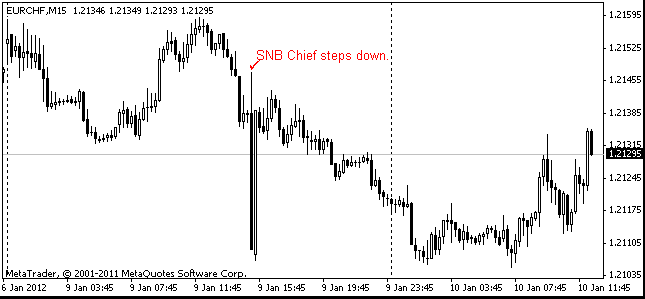EUR/usd
A number of vital events have happened in the market since our last review. Firstly, Obama formally gained the upper hand in the fiscal policy issue. The fact that the agreement had been finally reached (now taxes for those who earn more than 450K will be raised) led to opening of the currency and stock markets with an upward gap. S&P 500 returned to October highs, but this is all the bulls could do at the time. Since then the market has been steadily trading sideways and even the employment stats couldn't change the situation. In the currency market opening with a gap in eurusd quickly turned into a downward retracement. Moreover, the pair tested the support at 1.30. Though, at the end of the last week it bounced off this critical level. Now the market is focused on the debates around the US debt ceiling (this topic hasn't been included in the fiscal deal). Here it is expected that the terms will be dictated mainly by the republicans and this means that the deal will include spending cut terms in exchange for a higher debt ceiling. The US employment stats for December proved to be moderately positive. Employment growth rate didn't change in comparison with the previous months: 155K against 160K half a year ago. This rate lags behind the natural employment growth in the country. This is exactly why Bernanke has launched additional stimulation of the economy by means of bond purchases. In theory, this measure should reduce the yield of the bonds, but the latter, on the contrary, has been growing lately. Yet, this has been caused by temporary factors and will hardly last for long. The US bonds (and the dollar accordingly) are very likely to be in demand soon as there is a mighty hand which will withdraw 40bln from the market every month. And if the republicans will insist on spending cuts, purchases of the dollar may become even more active.

GBP/USD
Just like the euro the British pound was on the way to an important level of support. In gbpusd it makes 1.60. However, here the bulls also managed to get the better of the bears. Psychologically it supports the pair, but the situation will hardly last for long. As estimated by most economists the British economy shrank in the last quarter of the previous year and this year is also likely to slow down. Vital evidence is the drop of the PMI to the levels last seen in 2009. From the current 1.6080 we expect a new test of 1.60.

USD/JPY
The abundance of short positions in the yen has started to take effect. This week usdjpy began a gradual decline from above 88.30 and has already slid to 87.30. In the pair with the euro the situation is quieter: the pair is consolidating around 114.50. Yet the low market liquidity may lead to a further retracement. The market reaction to Abe's pressure on the BOJ was too strong. Even setting of the inflation target at 2% doesn't promise any quick changes in the policy.

EUR/CHF
Hardly had the Swiss research institute KOF published a report about an “exceptional steadiness” of the economy at the year-end when we started getting bad news. Today's employment stats have shown a sharp increase in the number of the jobless. It grew by more than 10K in December. A worse figure was seen only in December 2008. Taking into account the almost deflationary situation in the country, the SNB may soon again be pushed to ease the policy. Most likely, it'll be done by means of setting negative interest rates.
